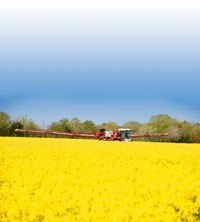Higher outputs would tempt more to grow oilseeds

Higher gross output would be the key reason for growers to increase their hybrid oilseed rape area, according to a recent survey.
Better tolerance to difficult seasons and more consistent performance came a close second and third with superior agronomics and ease of management also registering with a number of growers.
The Dekalb-commissioned report was carried out on the Farmers Weekly website, FWi, in mid-April and captured the views of 230 oilseed rape growers, representing a cropping area of 15,000ha. Hybrid varieties accounted for around 40% of the group’s 2008/09 cropping and most had some experience of growing hybrid varieties in the past three years.
Hybrids with higher gross output ratings would tempt 70% of the group to consider increasing hybrid growing and 68% said they would be tempted by greater tolerance to difficult seasons, even if they offered no yield advantage. More consistent performance, also in the absence of higher yields, would tempt 61% of the survey group.
Of those that grew hybrids, 84% said they were more vigorous to establish and 75% reckoned they were more vigorous in the spring. Better tolerance of late sowing was selected by 72% of growers and ease of management and harvest by 63%.
Oilseed rape challenges
Perpetual slug and pigeon problems, and rising fertiliser and agrochemical costs were identified as the most important challenges facing oilseed rape growers.
Less reliable autumn conditions, growing disease threats and weed problems were also seen as important by many.
Another survey, carried out by Syngenta Seeds and covering 23,000ha of oilseed rape, showed growers were looking for similar traits. But it also indicated a move away from hybrid varieties back to conventional.
In 2009, 32% of the total surveyed area was planted with a hybrid variety compared with 25% this season.
This was higher than the 13.5% in 2008, but growers had recognised that newer conventional varieties were achieving similar yields to hybrids in many situations, says sales, marketing and technical manager Nigel Padbury.
“Growers are using hybrids as a management tool on more difficult soil types, or for later sowing dates, because of better vigour and higher yields in situations where conventional varieties may respond differently.”
But growers were looking increasingly to vigour and consistency, he says. “Vigour, consistency and experience were choices that we didn’t include on the questionnaire. But significant numbers of growers specified these traits under “other”, placing them higher up the ranking than some of the traditional characteristics.”
It is likely that growers were using fast-establishing varieties as a rotational management tool to cope with resistant blackgrass populations in winter wheat, he says.
• code123
